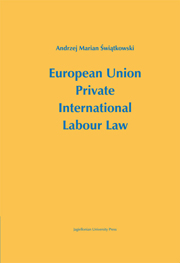Book contents
- Frontmatter
- Contents
- Introductory Comments
- Part I Preliminary Part
- Chapter 1 The subject of international private labour law
- Chapter 2 An attempt to erradicate any national labour law conflicts within EU private international labour regulations
- Part II Conflicts of law of individual labour law in the light of the Rome Convention of June 19, 1980 and Regulation of the European Parliament and the Council of the European Communities No. 593/2008 of June 17, 2008 on the law applicable to contractual obligations (“Rome I”)
- Part III Conflict of law issues in individual labour law in light of the Regulation (EC) No. 864/2007 of the European Parliament and the Council of the EU (July 11, 2007), concerning law applicable to Non-Contractual Obligations (“Rome II”)
- Part IV Conflicts of law in collective labour law
- Part V Conflicts of law in social security – the coordination of national social security systems of EU Member States according to the regulation of the European Parliament and Council Regulation (EC) No. 883/2004 of April 29, 2004 on the coordination of social security systems
- Part VI International procedural labour law of the European Union
- Selected bibliography
Chapter 1 - The subject of international private labour law
from Part I - Preliminary Part
Published online by Cambridge University Press: 05 September 2014
- Frontmatter
- Contents
- Introductory Comments
- Part I Preliminary Part
- Chapter 1 The subject of international private labour law
- Chapter 2 An attempt to erradicate any national labour law conflicts within EU private international labour regulations
- Part II Conflicts of law of individual labour law in the light of the Rome Convention of June 19, 1980 and Regulation of the European Parliament and the Council of the European Communities No. 593/2008 of June 17, 2008 on the law applicable to contractual obligations (“Rome I”)
- Part III Conflict of law issues in individual labour law in light of the Regulation (EC) No. 864/2007 of the European Parliament and the Council of the EU (July 11, 2007), concerning law applicable to Non-Contractual Obligations (“Rome II”)
- Part IV Conflicts of law in collective labour law
- Part V Conflicts of law in social security – the coordination of national social security systems of EU Member States according to the regulation of the European Parliament and Council Regulation (EC) No. 883/2004 of April 29, 2004 on the coordination of social security systems
- Part VI International procedural labour law of the European Union
- Selected bibliography
Summary
It is generally accepted that private international law is a branch of national (internal) law, which governs conflicts between rules of substantive law that should be used for the evaluation of social relations shaped by such laws and procedures. In the case of labour law, the subject of private international labour law are standards, which allow to select and apply labour law standards of particular Member States to assess the legal positions of parties within legal relations regulated by employment law (workers, employers) and social security law (the insured, policyholders and insurers). Labour and social security law is a branch capable of a certain reach only. Within the vast majority of countries, labour and social rights are governed by one system of labour law and one system of social security law. Occasionally, the federal states in their various organisational units, which make up the federation (states, provinces, regions, republics), have within their structure two separate systems of law both for labour and for social security. Establishing a work relationship between parties, of which at least one of the parties comes under the regulations of another member state, either on the grounds of nationality (lex patriae), or residence – domicile (employee, insured) (lex domicilii), or because of the location of the headquarters – situs (employer, insurer, the insurer – the insurance) (lex rei sitae), makes regulation necessary of the content of legal relations governed by different national systems of labour and social security law.
- Type
- Chapter
- Information
- European Union Private International Labour Law , pp. 13 - 24Publisher: Jagiellonian University PressPrint publication year: 2012

